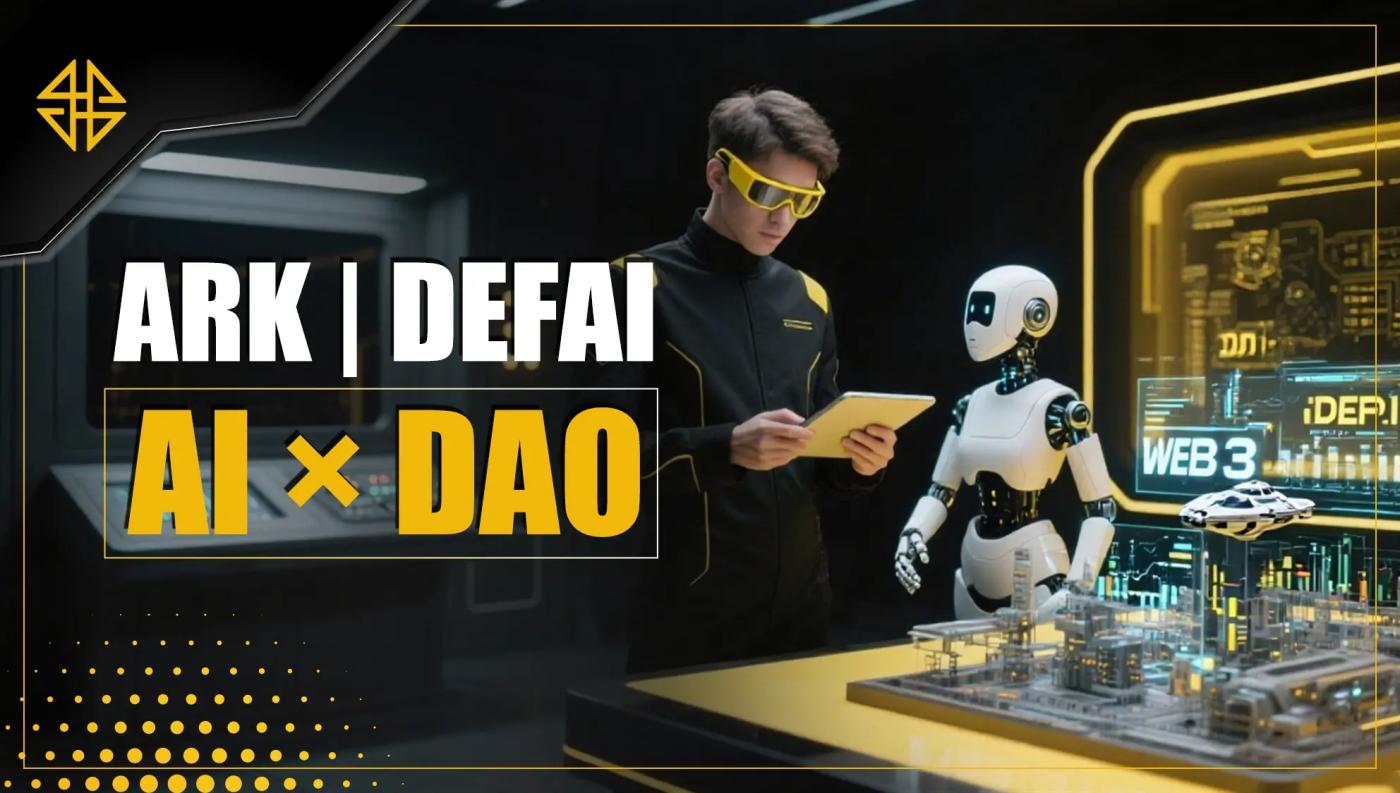Crypto media Decrypt published a feature article, reporting on ARK DEFAI's system design and narrative positioning. The project claims to be a "decentralized intelligent civilization framework," with its core goal not being to create a single financial protocol or product, but to establish a modular, evolvable logic layer governed by AI and DAO to support the coordinated operation of future digital finance and society.

The report points out that ARK shifts the trust foundation of decentralized protocols from brands and individuals to auditable models and transparent logic. Its underlying design combines three core dimensions:
- Decentralized AI system: Automatically simulating and predicting protocol conditions and proactively suggesting parameter recommendations;
- DAO governance mechanism: Driven by community proposals and assisted by AI in semantic review and risk screening;
- Modular architecture: All key financial functions (such as token issuance, stability mechanisms, reward distribution) are carried by smart modules, supporting governance, replacement, and expansion.
Decrypt specifically noted that ARK's contributors choose to participate anonymously and come from pioneer projects in protocols and AI fields such as Lido Finance, Olympus DAO, and early ChatGPT architecture development. This anonymous and decentralized identity design embodies ARK's commitment to "depersonalized trust" - trust no longer comes from specific leaders or teams, but from verifiable code, traceable governance records, and transparent institutional design.
Modular Economic System: Deconstructing Financial Design with Componentized Logic
At the protocol level, ARK DEFAI's modular economic system is its most engineering-valuable part. It does not rely on a single treasury or linear inflation model, but assembles a complete economic loop through logical modules. The five main modules include:
- Emission Manager (EM): Automatically adjusting token issuance rate based on user activity and protocol participation;
- Range Bound Stability (RBS): Maintaining token price within an algorithmically defined range, reducing violent fluctuations;
- Yield Revenue Feedback (YRF): Protocol revenue will be fed back to token issuance logic or used for asset buyback;
- Minting Cap Limit (MCL): Automatically controlling total token supply based on supply-demand ratio and protocol performance;
- Runway Control Module (RCM): Simulating protocol operation cycle, coordinating long-term rewards and emission sustainability.
This design gives the protocol "self-regulation" and "parameter governance" capabilities, escaping the liquidity traps and price fragility brought by traditional rigid token issuance or inflation models.
More importantly, these modules are not closed systems, but governable modules that can be updated or replaced through community proposals, possessing modular composability and upgradability, making economic logic no longer dependent on single-team design, but truly moving towards protocol autonomy.
Redesigning Governance: From Voting Behavior to Logical Training
ARK proposes structural innovation in governance, with the core being: Governance is not voting, but a process of participating in training the protocol's behavioral model.
Governance participation is no longer just about deciding "yes or no," but involves predictive simulation of proposals, using AI tools for risk assessment and semantic review to enhance governance decision data basis. Through the time-weighted governance rights represented by "ARK Power Non-Fungible Token", combined with reputation weight and participation history, a more reasonable participant rights and responsibilities mechanism is established.
Additionally, the governance process integrates simulation tools, allowing users to pre-simulate the dynamic impact of policies on protocol modules before implementation, making each governance instance have a certain degree of explainability and predictability, moving towards "training-based governance".
The Role of ArkLand: Application Layer is Not a DApp, But a Modular Social Protocol
Besides the protocol and economic system itself, ARK also proposes ArkLand as an extended application layer space. Unlike traditional chain applications pursuing use cases, ArkLand is a "modular social protocol field" composed of five modules, covering:
- Arkonomics: Providing decentralized financial modeling and liquidity management tools;
- Edunet: Constructing learning agents, creative modules, and test assistance AI;
- Vitality: Offering health management, behavioral advice, and habit tracking services;
- Connect: Creating personalized social experiences through Non-Fungible Token and semantic agents;
- Creator Layer: Users can use no-code tools to build, govern, and monetize modules.
These modules can be trained, governed, and can evolve and fork according to market and community needs, demonstrating the possibility of a protocol as a platform, and a platform as a civilization carrier.
Protocol Logic Narrative Advancement: From Tools to Order Layer
What ARK DEFAI presents is not just a protocol, but a new narrative structure:
- Elevating protocols from transaction tools to a governable order layer;
- Upgrading governance from voting mechanisms to a trainable, simulatable intelligent consensus process;
- Transforming economic systems from treasury models to a parameterized modular logical network;
- Expanding the application layer from single-point product platforms to a collaborative, evolvable module civilization testing ground.
When a protocol possesses self-regulation capabilities, model-based governance logic, and modular social construction potential, what it carries is no longer just a financial application, but an entire decentralized institutional framework that can be co-created and transparently evolved. This is not only an expansion of Web3 governance boundaries but also a technical layer practice of the decentralized civilization vision.








